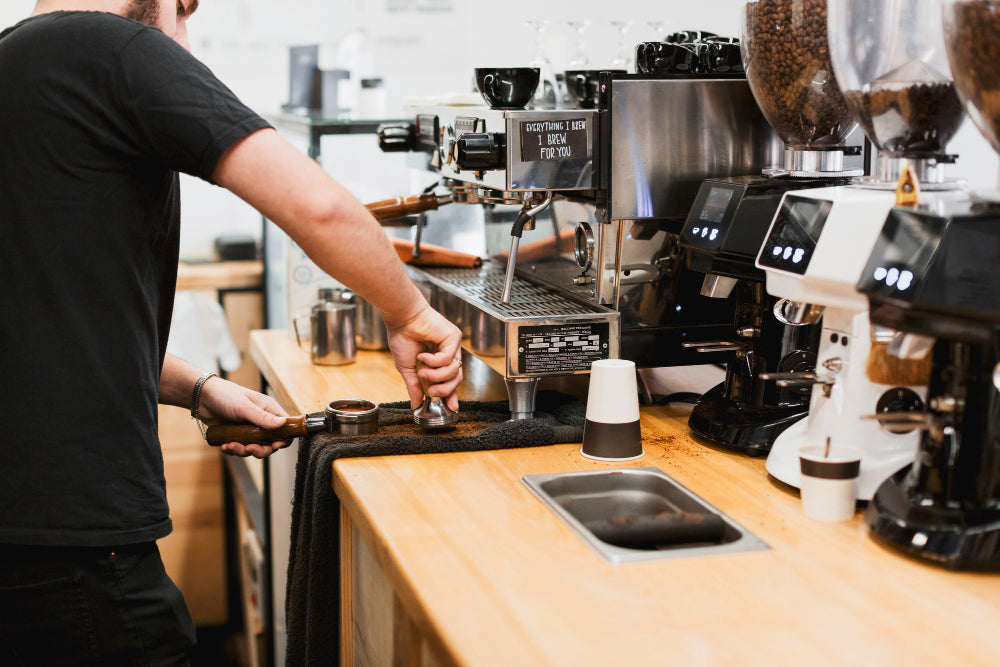How to Open a Café: A Complete Step-by-Step Guide from Permits All The Way to Espresso Machines
Mark Battalini
Opening a café is a dream for many coffee lovers and entrepreneurs, but turning that dream into reality requires more than just a love for lattes. From finding the right location and navigating permits to selecting the best espresso machine, every step matters. This guide walks you through how to open a café, what to expect, and how to set yourself up for success.
1. Define Your Vision and Business Plan
Before you secure a lease or buy equipment, define your café’s concept:
- What’s your vibe? Cozy neighborhood café, modern minimalist, specialty coffee bar?
- What will you serve? Espresso drinks only? Full menu with pastries or lunch?
- Target audience? Commuters, students, remote workers, or weekend brunchers?
Create a business plan that outlines:
- Startup costs and funding
- Projected revenue and expenses
- Menu offerings
- Staffing needs
- Marketing strategy
- Competitive analysis
A strong business plan not only keeps you focused but is also essential if you're applying for a loan or looking for investors.
2. Find the Right Location
Location can make or break your café. Look for:
- High foot traffic
- Ample parking
- Visibility from main roads
- Nearby offices, schools, or residential areas
- Reasonable lease terms
Check zoning laws to make sure a café is permitted in the area.
3. Obtain Required Permits and Licenses
Running a café means complying with local, state, and federal regulations. Common requirements include:
Permits & Licenses:
- Business license (general operating license)
- Food service license from your local health department
- Retail food establishment permit
- Building and occupancy permits (especially if renovating)
- Resale certificate (for selling taxable goods like food and coffee)
- Employee identification number (EIN) from the IRS
- Sign permit (for exterior signage)
- Music license (if playing music in your café)
Check with your city’s planning department or small business association for exact requirements based on your location.
4. Design and Build Out Your Space
Once you have your location and permits secured, you’ll likely need to renovate or customize your space.
Key Considerations:
- Plumbing and electrical upgrades for commercial equipment
- Ventilation (especially for ovens or cooking appliances)
- ADA compliance for accessibility
- Customer flow and layout (register, seating, barista station)
Work with a licensed contractor and possibly an interior designer to balance function and aesthetics.
5. Buy the Right Equipment
Here’s a basic checklist of what you’ll need:
Coffee & Beverage Equipment:
- Espresso machine (see recommendations below)
- Coffee grinder (burr grinder for consistency)
- Drip coffee brewer
- Coffee bean storage containers
- Water filtration system
- Milk pitchers and steam wands
- Cold brew equipment (optional)
Kitchen Equipment (if serving food):
- Commercial refrigerator and freezer
- Prep tables
- Microwave or oven
- Toaster
- Dishwasher or 3-compartment sink
- Pastry display case
General Café Essentials:
- POS system (point of sale)
- Cash register or card reader
- Wi-Fi router and guest network
- Shelving and storage
- Cups, lids, napkins, sleeves
- Seating, tables, and décor
- Security system and cameras
6. Choose the Right Espresso Machine
Your espresso machine is the heart of your café. Choose one that matches your volume, staff experience, and customer expectations.
Recommended Espresso Machines:
La Marzocco Linea PB or Linea Mini
- Industry gold standard for consistency and performance
- Great for high-end or specialty cafés
- Manual or semi-automatic
Nuova Simonelli Appia II
- Affordable and reliable for moderate-volume cafés
- Ergonomic and beginner-friendly
- Available in 1-, 2-, or 3-group configurations
Super Automatic Machines (like Franke or Jura GIGA X8)
- Best for self-serve, office-style cafes or fast-paced environments
- Push-button convenience with integrated grinder and frother
- Less barista skill required
At La Vela Coffee, we offer espresso machine rentals and sales tailored to your needs, along with training and service packages.
7. Find the Right Coffee Supplier
Your beans define your flavor. Work with a local roaster or reputable wholesale partner that offers:
- Freshly roasted beans
- Bean variety (single origin, blends, espresso roast)
- Training support
- Flexible pricing and delivery
Also consider sourcing pastries, teas, and alternative milk from local vendors to round out your offerings.
8. Hire and Train Your Team
Your baristas are the face of your brand. Hire for personality as much as skill—friendly, attentive service keeps customers coming back.
Training should cover:
- Espresso extraction
- Milk steaming techniques
- Drink consistency and speed
- Health and food safety standards
- Customer service and upselling
9. Market Your Café
Start promoting before you open:
- Tease your opening on social media
- Offer free samples or soft launch days
- Collect emails for newsletters and coupons
Ongoing Marketing Ideas:
- Loyalty programs or punch cards
- Google Business Profile and Yelp presence
- Local press or community events
- Branded merchandise (mugs, shirts, bags)
- Monthly specials or seasonal drinks
10. Prepare for Challenges
Opening a café can be exciting—but also demanding. Be ready for:
- Supply chain issues (beans, cups, etc.)
- Employee turnover
- Unexpected inspections or repairs
- Slower-than-expected sales in the beginning
Stay flexible, track your numbers, and seek support from mentors or café owner communities.
Final Thoughts
Opening a café takes planning, patience, and passion. But with the right tools, team, and vision, your café can become a community hub—and a profitable business.
La Vela Coffee is here to help you at every step—from sourcing premium beans and choosing the perfect espresso machine to providing equipment rental, barista training, and business consulting.
Let's Build Your Dream Café Together
La Vela Coffee – Miami, FL
(305) 555-1234
www.LaVelaCoffee.com
nfo@lavelacoffee.com



